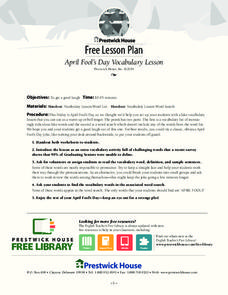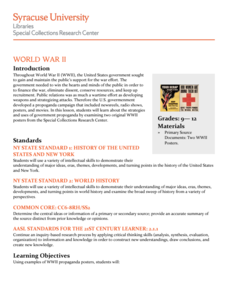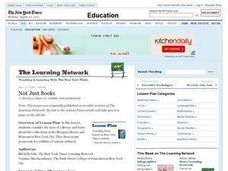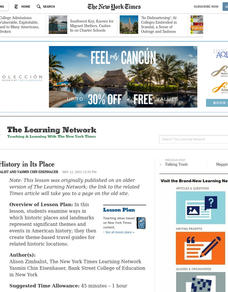Facing History and Ourselves
How Should We Remember?
We must remember the past in order to avoid its mistakes. Young historians analyze the importance of historical remembrance using primary and secondary documents, as well as video clips. They then study the creation of a World War II...
Channel Islands Film
Dark Water: Lesson Plan 1 - Grades 3-4
As part of their study of the history of the Channel Islands, class members craft an informational article to post on a bulletin board that features the Chumash ancestral tradition of tomol paddling.
Middle Tennessee State University
The Invention of the Telephone
All of the people in your class would agree that life would be different without the invention of the telephone! Study Alexander Graham Bell's most famous and influential invention through the primary source document of his sketch of the...
Facing History and Ourselves
Decision-Making: Introduction to the Unit
Make your classroom a supportive and communicative place to be before beginning a unit on the Holocaust. Working together as a class, learners reflect on their previous experiences of classroom discussions before establishing a...
Prestwick House
April Fool’s Day Vocabulary Lesson
Quandimonium will ensue when the class discovers you will be grading this April Fool's Day vocabulary activity, complete with made-up words and definitions, although the truly perspicacious will remain axomachilliax.
Civil War Trust
Civil War Play
Raise the curtain to a class play that depicts the Civil War through both factual information and literary devices. The performance showcases the Battle of Antietam (Battle of Sharpsburg) and brings attention to women's roles, as well as...
Syracuse University
Harlem Renaissance
The music and literature of the Harlem Renaissance defined American culture, including its poetry. Using a poem from the period, individuals explore its musical qualities and how it is reflective of the period. Then, they use what they...
Syracuse University
World War II
During World War II propaganda was as important to the war effort as the soldiers in the field. Scholars consider how the government communicated messages of patriotism with propaganda by examining pieces from World War II. Then, they...
Curated OER
Ceramic Sculpture: Lesson Plan
Three-Dimensional sculpture, the artists who create it, and ceramic techniques are all covered in this plan. Tenth graders take a trip to a local art museum, watch a presentation on clay sculpture, then design a 3-D art piece. They study...
Curated OER
Not Just Books
Students consider uses of a library and explore the collections at the Morgan Library and Museum in New York City, and create proposals for exhibits of various artifacts.
Curated OER
The American Dream
Students define the American dream. In this primary research lesson plan, students search the Library of Congress digital collections for primary sources regarding the ideal of the American dream. Students create presentation to...
Curated OER
The Home Front (Circa 1863)
Students interpret historical evidence presented in primary and secondary resources. In this American Civil War lesson, students examine sources and then write personal accounts of the war.
Curated OER
Reader's Paradise
Students visit the school or local library (or bookstore) to create short film or radio documentary that records a specific habit or ritual associated with reading, book buying, or book borrowing.
Curated OER
The Pirates of the Caribbean
Third graders participate in a demonstration lesson that shows a map of the Caribbean Islands. They examine a natural resource that each island is known for. Next, they listen to a read aloud of Gail Gibbons, "Pirates: Robbers of the...
Curated OER
Going Green
Students create an action plan to learn how to preserve natural resources for future generations. In this environmental conservation lesson, students research the topic of preserving the natural environment and write a definition for...
Curated OER
Water, Glorious Water
Young scholars identify the various uses of water. In this water conservation lesson, students read the book, The Drop In My Drink: The Story of Water On Our Planet and write down their favorite uses of water. Young scholars illustrate...
Curated OER
Water Ways Lesson Plan #1: Who Catches Your Fish?
Students explore the types of fish caught in the Mid-Atlantic region. In this fishing lesson plan, students learn about fishing methods and meet fishermen that catch the fish. Using the water ways website, students research types of...
Curated OER
All About Computers
Students discover facts about computers. In this technology lesson, students find out how to locate information on the Internet. Students choose a topic to research and search several sites for information.
Curated OER
Following the Leaders
Examine the historic election of Pope Benedict XVI and reflect on the challenges he faces as the new leader of the Catholic Church. This New York Times lesson investigates how other world leaders are chosen in different forms of...
Curated OER
A New Era for Palestinians
Get a global perspective and examine the challenges facing Mahmoud Abbas, the newly elected president of the Palestinian Authority. Thoughtful classroom citizens write letters to Mr. Abbas, asking him questions and suggesting advice....
Curated OER
Is That a Fact?
Investigate popular scientific claims and gather evidence to defend or argue against an author's stance. Writers synthesize information and compose their own "Really?" columns modeled after those found in the weekly "Science Times"...
Curated OER
Putting History in its Place
Examine ways in which historic places and landmarks represent significant themes and events in American history. Then create theme-based travel guides for related historic locations. This lesson plan requires informational reference...
Digital Public Library of America
Teaching Guide: Exploring Little Women
Louisa May Alcott's Little Women is a literary masterpiece as well as a timestamp of the formative mid-nineteenth century in America. Using a primary source set of photographs, letters, and portraits, readers discuss the ways...
PBS
Character vs. Society in The Invisible Man
Ralph Ellison's Invisible Man is difficult to read and difficult to teach. The novel is so highly regarded that it is one of most often listed as an option for the AP Literature and Composition exam. The materials in this packet from PBS...

























